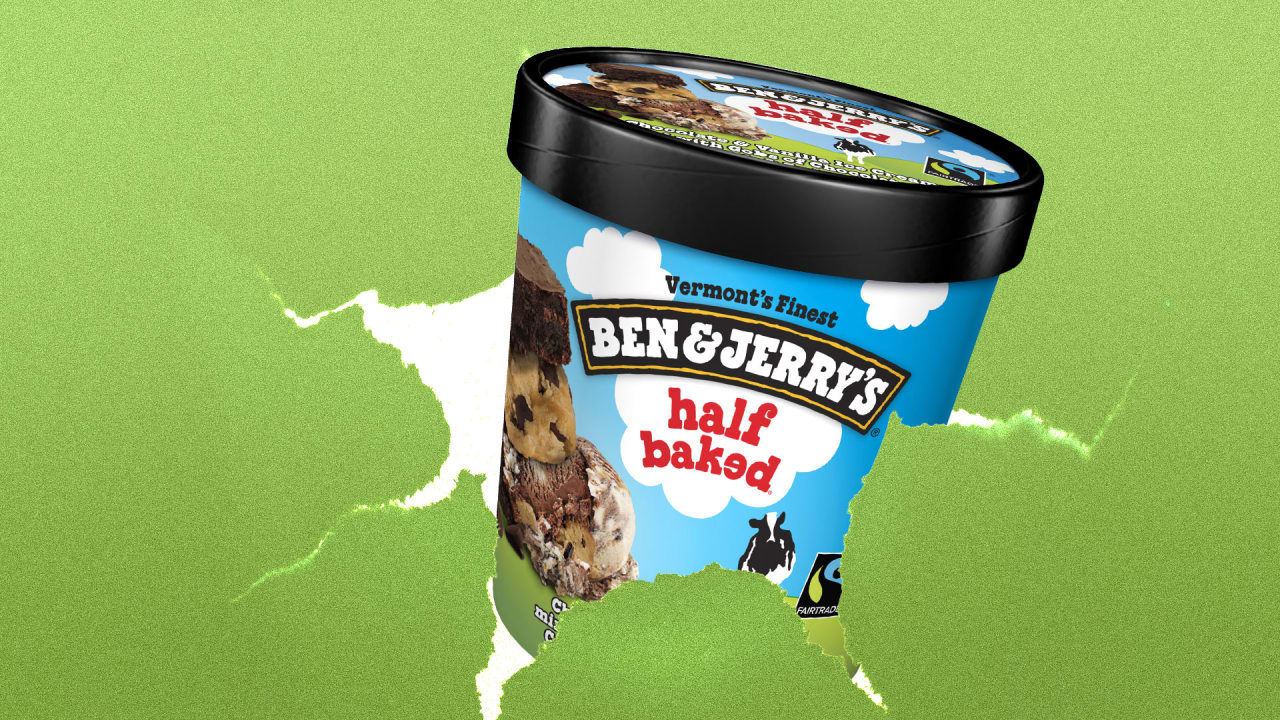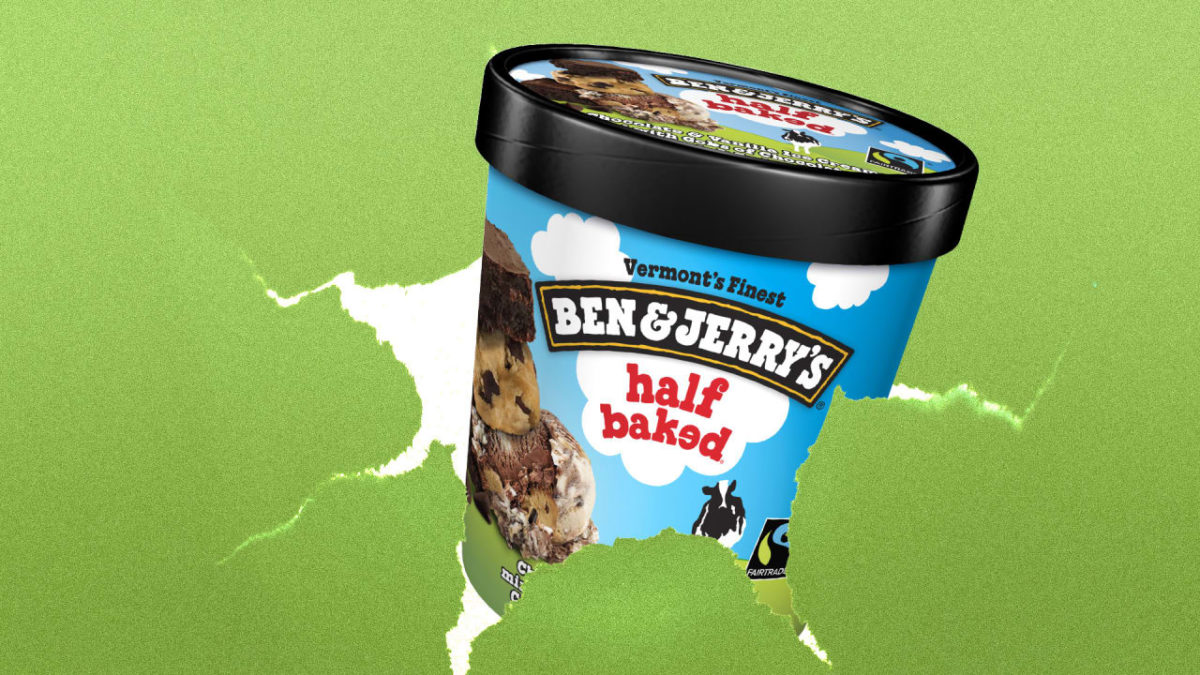
Ben & Jerry’s is the most high-profile and popular poster child for the phrase “brand purpose.” (Okay, okay, Patagonia is also right up there in the conversation.) Over the past 40 years, the ice-cream maker has worked to set the precedent that brands can take a stand on social, political, and environmental issues—while still having fun and running a successful business. Ben & Jerry’s can tweet, “The murder of George Floyd was the result of inhumane police brutality that is perpetuated by a culture of white supremacy,” as it did in the wake of Floyd’s 2020 murder. And it can be playful with its flavors and its marketing, creating products with names like Dirt Cake and Boom Chocolatta. That is called range, and it works together to sell $1 billion worth of ice cream annually.
Right now though, Ben & Jerry’s legacy and its ability to balance business and purpose has become as precarious as a bowl of Cherry Garcia left in the sun.
In July, Ben & Jerry’s took the highly unusual and virtually unprecedented step of suing its parent company, Unilever, the $121 billion market cap global consumer packaged goods conglomerate. The case is over the parent company’s move to sell Ben & Jerry’s Israel business to a local licensee after Ben & Jerry’s itself announced in 2020 that, because of human rights concerns, it would not be selling its products in the West Bank. Ben & Jerry’s contends that handing over control of its brand to someone else in Israel would cause customer confusion around the values the brand has spent decades building and ultimately dilute and deteriorate its global reputation. Unilever, obviously, disagrees. This past week found the two companies in federal court arguing over whether Ben & Jerry’s merits a preliminary injunction to stop Unilever’s sale to the Israeli licensee.
A new culture of self-censorship
Whatever the public reaction to this dispute is and will be, it’s already having a significant impact inside Ben & Jerry’s. I spoke with someone close to the situation, and they said that the company culture has taken a hit and that there’s a sense internally of a lack of transparency and communication about what’s really going on. Meanwhile, in the past the brand felt relatively free to weigh in on any issue that they felt relevant to speak out on. Now, Unilever is requiring a more stringent chain of corporate approvals.
The person tells me that this is starting to breed a culture of self-censorship, leading to Ben & Jerry’s perhaps being a bit less engaged on issues compared with the last several years. The company has strong views on the overturning of Roe v. Wade, the fight for reproductive health services, and trans rights, but given that things are harder internally, Ben & Jerry’s has been doing less in terms of adding its voice to these public debates.
The birth of a stand
If you want to find the foundation for Ben & Jerry’s policy on not wanting to sell its ice cream in Israeli territories of East Jerusalem and the West Bank, you need to go back to 2014 and the police killing of Michael Brown in Ferguson, Missouri. Out of the anti-racism protests and national conversation about police brutality and systemic racism, the Vermont-based ice-cream brand began to build relationships and advocacy roles with activists and organizations speaking out on this cause. Soon, through discussion with its new friends, brand executives realized that these issues were not limited to U.S. borders. According to my well-placed source, it became impossible to talk about systemic racism in America and the need to reform the criminal justice system without a more international lens. Ben & Jerry’s spoke out for the rights and dignity of asylum seekers and refugees in Europe in 2015. It felt it could not be completely silent on the issue of Palestinian rights.
Ben & Jerry’s ability to do any of its activism separate of Unilever stems from a unique component of the company’s acquisition back in 2000. The lynchpin in that agreement was the establishment of an independent board of directors to be responsible for the social mission, policies, and the integrity of the Ben & Jerry’s brand, including such issues as factory wages and sustainable ingredient sourcing.
For more than two decades, that relationship has helped grow Ben & Jerry’s business and its advocacy, as well as Unilever’s bottom line. In the 2000s, the ice-cream maker protested the Iraq War and created the world’s largest Baked Alaska dessert to protest President Bush’s attempt to open up the Alaskan Arctic National Wildlife Refuge for oil drilling. Last year, CEO Matthew McCarthy wrote a Fast Company op-ed in support of H.R. 40 and starting the process of reparations for Black Americans.
The relationship between Ben & Jerry’s and Unilever, I am told, was always best when the lines of communication between Ben & Jerry’s CEO, the independent board, and Unilever were open and respectful: respectful of each other, but also of that key component of the acquisition agreement. There have been disputes in the past, especially early on, whether it was trying to get the ice cream maker to add more air to the ice-cream in order to increase margins, or trying to get them to ditch their socially-conscious brownie supplier, Greyston Bakery in Yonkers, New York.
This time, it’s different. There’s the increasing politicization of business, epitomized by Florida’s Stop Woke Act. Overall, there’s a fraught cultural tenor for brands that wade into the discourse. Add in the political third-rail issue that is Israel, and it’s a perfect storm for a dispute like this. We saw a similar firestorm ignite back in 2018, when Airbnb initially announced that it would remove rental listings in the Israeli-occupied West Bank, then reversed course after a significant political backlash. Last July, Israeli Prime Minister Naftali Bennett told Unilever CEO Alan Jope that Ben & Jerry’s decision would have “serious consequences, legal and otherwise,” and Israel “will act aggressively against all boycott actions directed against its citizens.” Because Ben & Jerry’s has taken its parent to court, Unilever has reportedly frozen the salaries of the brand’s independent board of directors. Board chairperson Anuradha Mittal told Reuters earlier this month, “If Unilever is willing to so blatantly violate the agreement that has governed the parties’ conduct for over two decades, then we believe it won’t stop with this issue.”
What’s next?
If this is indeed a referendum on the compatibility between truly purpose-led brands and public corporations, what’s the most likely outcome? Given the lack of conciliatory communication between Unilever and Ben & Jerry’s, with each side digging in on their respective positions, the most likely–and discouraging for anyone hoping a more conscious version of capitalism was possible–outcome is that Unilever uses its size, power, and influence to play CPG Palpatine and crush this ice-cream rebellion. The result of which will likely be continued sweet sales built on the back of a reputation and brand image that will no longer exist in practice. Eventually, Ben & Jerry’s could become just another subsidiary that spews vaguely progressive, feel-good platitudes, and the closest thing to activism we see from it in the future is posting an image of a rainbow flag on Instagram every June.
That outcome will bring all corporate-owned, purpose-led brands into question, with people knowing that there is a limit to just how much purpose a brand can have. It should also weigh heavy on the minds of any social-good entrepreneurs considering an acquisition offer. If it’s between a brand standing by its values for what’s right for the planet or people, or maximizing profits, the parent company will always take the Henry Hill approach.
My source familiar is actually more optimistic than my gloomier forecast. They say that the best-case scenario here is a return to normalcy, where both parties agree that the acquisition agreement governs how these two companies work together, and that they can reset the way in which the board, Ben Jerry’s CEO, and Unilever work together to pursue what’s in the best interests of Ben & Jerry’s. Because, ultimately, what’s in the best interests of Ben & Jerry’s is in the best interest of Unilever. When the brand is strong, the parent is strong.
Back in 2019, Unilever CEO Jope agreed, telling the Deutsche Bank Global Consumer Conference that the corporation’s 28 “Sustainable Living” brands–those taking action to support positive change for people and the planet–grew 69% faster than the rest of his business and delivered 75% of its overall growth. He actually name-checked Ben & Jerry’s for illustrating the impact that brands can have in addressing environmental and social issues. “But talking is not enough,” Jope said. “It is critical that brands take action and demonstrate their commitment to making a difference.”
He’s absolutely right. Now he just needs to follow his own advice.





